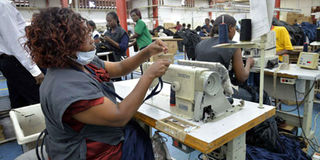America to train sewing machine operators at Kenyan hubs

Workers at United Aryan EPZ, Nairobi. The firm has asked the government to equip technical training institutes with modern machines. FILE PHOTO | NMG
What you need to know:
- The programme, which begins on August 21, will see Mombasa Apparel, which churns out about 250,000 finished products monthly, receive the first cohort of trainees to be located at its Mombasa and Kilifi factories, while Africa Apparel EPZ will receive its first batch on August 28.
- The programme targets 2,000 youth and comes a year after the American Government extended the African Growth and Opportunity Act (Agoa) to 2025, allowing Kenyan-produced apparel among other processed products, duty-free access to its market.
- The initiative follows a survey that revealed a number of shortcomings in Kenyan apparel industries — among them lack of skilled manpower to handle industrial sewing machines for commercial production of high-end clothes.
The American Government has selected two industrial tailoring businesses in Nairobi and Mombasa to act as training centres for sewing machine operators.
The programme, which begins on August 21, will see Mombasa Apparel, which churns out about 250,000 finished products monthly, receive the first cohort of trainees to be located at its Mombasa and Kilifi factories, while Africa Apparel EPZ will receive its first batch on August 28.
The programme targets 2,000 youth and comes a year after the American Government extended the African Growth and Opportunity Act (Agoa) to 2025, allowing Kenyan-produced apparel among other processed products, duty-free access to its market.
In a statement, the project implementers, East African Trade Hub, said the training is part of its larger East Africa Cotton, Textile and Apparel Work Force Development Initiative that is planned for roll-out in other regional countries.
Shortcomings
The initiative follows a survey that revealed a number of shortcomings in Kenyan apparel industries — among them lack of skilled manpower to handle industrial sewing machines for commercial production of high-end clothes.
A report by the Export Processing Zone Authority shows that apparel factories are incurring heavy losses as they shoulder costs on transfer of technology training for their workers before allowing them to handle various specialised tasks in the clothes-making chain.
The report observes that Royal Garments Industries, New Wide Garments, Mombasa Apparel, Mega Garments Industries, Mahalakshmi Garments and United Aryan are among companies urging the government to equip technical training institutes with modern industrial machines that would enable Kenya to train employable young people.
Those involved will undergo an eight-week on-the-job training as well as receive entrepreneurial skills inculcating work ethics that promote continuity and higher production.
Export earnings
Kenya is an established apparel, footwear and travel goods manufacturer, employing about 42,000 Kenyans at various apparel factories across the country. Last year, the sector generated Sh37 billion in export earnings.
Apparel EPZ companies have also been grappling with lack of adequate land to expand their production facilities, forcing some to buy land while others have asked for allocation of land within the counties they operate.




